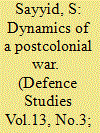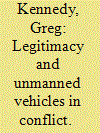| Srl | Item |
| 1 |
ID:
126386


|
|
|
|
|
| Publication |
2013.
|
| Summary/Abstract |
This paper analyses the subject of targeted killing: operations undertaken to kill individuals regarded by counterinsurgent or counterterrorist forces as being vital to the efficient functioning of insurgent or terrorist organisations. The analysis judges the military and political effectiveness of killing such individuals, and provides practical advice on improving the targeting process. In so doing it contributes also to the wider debate on the future direction of UK counterterrorism policy beyond the scheduled end of the US-led NATO campaign in Afghanistan in 2014.
|
|
|
|
|
|
|
|
|
|
|
|
|
|
|
|
| 2 |
ID:
126385


|
|
|
|
|
| Publication |
2013.
|
| Summary/Abstract |
The 'war on terror' has become the grammar of contemporary international relations. Analysis of the 'war on terror' has become overdetermined by broader discussion about the utility of organized violence following the end of the Cold War. This focus has led to a perception that the link between war and politics has been fundamentally weakened, if not entirely severed. This article argues that the 'de-politicization' of war thesis gets in the way of a more fruitful understanding of the relationship between international order and the occurrence and conduct of warfare. Paradoxically, policy that may stem from an analysis that depoliticizes armed conflict makes it more difficult to imagine the possibility of peace. Colonial-type wars are one instance of armed conflict which is asymmetrically depoliticized. The attempt to fit the 'war on terror' into a colonial war-shaped hole is unsustainable. Colonial warfare cannot provide solutions to postcolonial military challenges. This article argues for an understanding of the 'war on terror' as postcolonial war in which the political is very much present.
|
|
|
|
|
|
|
|
|
|
|
|
|
|
|
|
| 3 |
ID:
126369


|
|
|
|
|
| Publication |
2013.
|
| Summary/Abstract |
In this article the author points out many contradictory elements of the use of drones for targeted killing that clash with stated desired outcomes of American foreign policy. He argues that through the use of such technologies the US quest for better international relations is unlikely, given the contradictory nature of American calls for other nations to abide by international law, while at the same time using drones for targeted killings in a fashion that many in the international community see as being outside of the accepted rules of international conduct. Finally, he argues that the use of such drone strikes has the potential to alienate British public opinion and therefore British policy-makers, thus creating friction in the Anglo-American strategic relationship.
|
|
|
|
|
|
|
|
|
|
|
|
|
|
|
|
| 4 |
ID:
126405


|
|
|
|
|
| Publication |
2013.
|
| Summary/Abstract |
For almost a decade, the Canadian military enjoyed substantial, sustained increases to its budget. This funding increase enabled the repeated deployment of the Canadian Forces abroad in the pursuit of international influence. This prominent role for the military in Canadian foreign policy is slated to change, however, as a shift to austerity is forcing significant cuts to Canadian defence spending. Despite official claims that these reductions will be made through back-office efficiency reforms, the magnitude of the budgetary losses and the manner in which they are structured mean that they will result in a significant reduction in military capacity. While front-line military capabilities will be retained, the operational readiness of these forces will be reduced significantly. As a result, the military will be unable to play the relatively active role in expeditionary operations it has in recent years, and Canada returns to a more realistic level of military activity for a secondary power.
|
|
|
|
|
|
|
|
|
|
|
|
|
|
|
|
| 5 |
ID:
126412


|
|
|
|
|
| Publication |
2013.
|
| Summary/Abstract |
This paper describes ten recurring problems which afflict the Ministry of Defence's acquisition of complex defence equipment. These problems are manifest in the notorious cost overruns and delays which beset such projects. Some of the problems arise because the projects are large and complex, and perforce must incorporate leading-edge technologies, and because of the diverse cultures of the personnel needed to manage the acquisition process. Others arise from the special (and widely misunderstood) characteristics of defence acquisition, and from the multiple interfaces between the operating services and industrial suppliers in the UK and in other nations. Since diagnosis is useful only if it is accompanied by relevant treatment, the authors propose appropriate remedial action for each of the ten problems they have identified
|
|
|
|
|
|
|
|
|
|
|
|
|
|
|
|